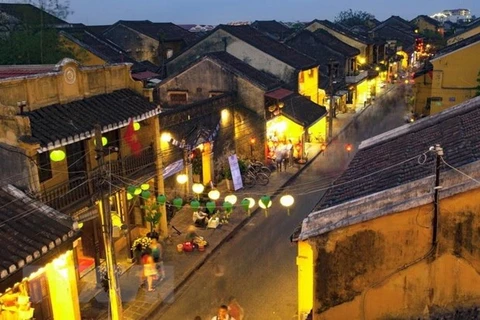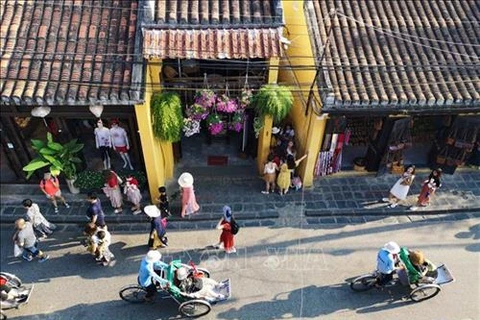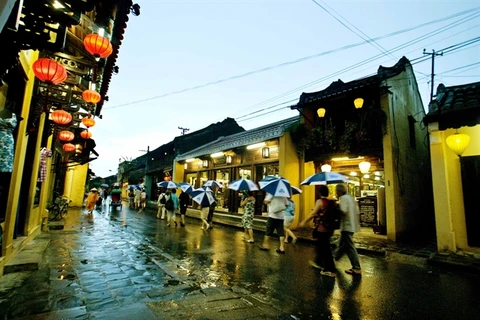Quang Nam (VNS/VNA) - Buffaloes have been considered close companions and among the most valuable property of farmers.
For many farmers in Hoi An in the central province of Quang Nam, buffaloes are also the highlights of eco-tours hosted by the Jack Tran Tours company.
So in the Year of the Buffalo, they have more tales about the animals to tell than ever.
Tran Van Khoa, sales manager and owner of the company, said that the idea for the tour came to him on a field trip he took a group of foreigners to visit Tra Que vegetable village on the outskirts of ancient Hoi An town 10 years ago.
“The foreign tourists seemed to be interested in buffaloes eating grass,” he said. “They asked the owners to take photos with the cattle. They often tipped the farmers one or two US dollars for each photographing session. I thought the buffalo might be a special tourism product that will bring more income to farmers.”
Over the time, the company has gathered nearly 20 farmer families who own some 100 buffaloes for wet rice tours, which offer tourists the chance to work in the field with buffaloes. Before the pandemic, each year the company received 2,000-3,000 guests, bringing each family 10-15 million VND (434-651 USD) a year.
Such a tour lasts for five hours when tourists try various farming tasks.
At first local farmers were not willing to join the service,” Khoa recalled. “They thought foreigners would never like dirty work in the field. I spent lots of time to persuade them.”
Now the tour attracts mostly group tours and families at a ticket cost of 1.3 million VND each including lunch at homestays.
Local farmer Le Nhien, in his mid-50s, who has raised buffaloes since his childhood, is among the farmers who have worked the longest with the company.
“We often choose strong male buffaloes for the job,” he said. “They are gentle, good-looking with twisted hair in the middle of their heads, stubbed noses, big ears, square forehead and bent back, which shows that the buffaloes are very hard-working. The buffaloes with red eyes should not be chosen to serve visitors as they are aggressive.”
“We teach them to stand up following oral orders and be friendly to visitors. The buffaloes should also have at least two years of experience working in the field as they will be more agile and hard-working,” he said.
“I let them sniff perfume and sun cream to be familiar to tourists’ smell,” he revealed.
The trainers should control their buffaloes by short and sharp orders like di means “walk to the left”; ha means “walk to the right”; do means “stop”, and dun means “walk backwards”.
He now owns in total 20 buffaloes and the five best work on the tours. The buffaloes bring home 10-15 million VND per month, double the income from growing rice, he said.
He even names his buffaloes like humans with names such as Gio, Si, Tuong and Phao.
The buffaloes are given young rice to be stronger and can work in the field from the ages of three to 20.
Beside stable income from tourism, each female buffalo may give birth to a baby each year, Nhien said.
Nhien said each peak month before the pandemic, his family could get 20 million VND per month including tips from tourists.
“I have enough money to raise three children,” he said. “My eldest son helps me with the tours.”Khoa said most of the tourists like his eco-tours with the wet rice planting experience, which also helps create more jobs for locals, and the Jack Tran Tours page is filled with good reviews on Tripadvisor.
Khoa said in 2020, the pandemic has seriously affected tourism in Hoi An, including buffalo tours.
“I was shocked and very sad to tell my staff of 30 people and dozens of involved farmer families to stay off from work as there have been no tourists,” he said. “I gave them each 5 million VND for three months at the beginning of the pandemic.
"Before the pandemic, we received 20-100 tourists per day. Now, there are only 1-2 tourists per day or even no tourists in the past year.”
“The farmers and buffaloes now focus only on their farming work,” he said. “I sometimes support them some money to care of the buffaloes.”
“I just hope the disease will soon be controlled with vaccines so that tourists will return to us,” he said.
This year, the company will aim focus on domestic guests with 50 per cent discounts for the tours.
He said a group of tourists has just booked a tour of 45 minutes at VNĐ500,000 per person.
Some customers have also booked the tour for this summer, he said.
“We always compare the buffaloes to the BMWs of the field: strong and valuable,” he said.
“They do not only resemble the familiar image of Vietnamese village and traditional culture but also of the patience and resilience of Vietnamese people to overcome obstacles.”/.
VNA
























